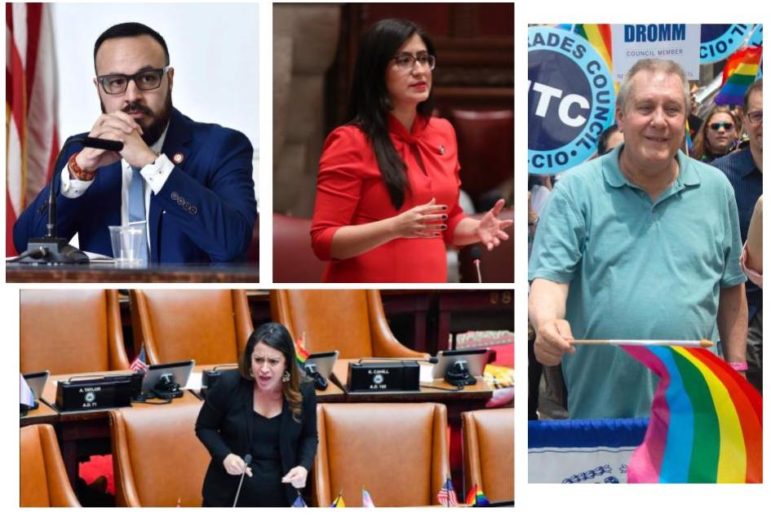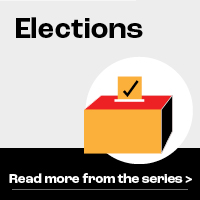
NYC Council/NYS Senate/NYS Assembly
Queens progressives (clockwise from top left) Councilmember Francisco Moya, State Senator Jessica Ramos, Councilmember Danny Dromm and Assemblymember Catalina Cruz have each tangled with an emboldened left in recent weeks.Danny Dromm has long been seen as one of the more progressive members of the New York City Council, known in particular for his advocacy of public schools and the LGBTQ community. But recently Dromm has become a target of advocates and protesters with whom he has often sided.
After the Finance Committee that he chairs passed a budget that removed a billion dollars from the police budget, Dromm celebrated a “responsible, transformative budget”, while critics derided “budget tricks” that mostly shuffled funding without addressing concerns about over-policing.
“This was a sham,” says Maria Bautista of the Alliance for Quality Education. “What education advocates have been fighting for is police-free schools. This just moves people around to different departments. A cop is still a cop regardless of where they are. We’re talking about a budget that is continuing the criminalization of Black and Brown people.”
Dromm’s experience is not unique. Across the country, the sudden growth of demands to defund and even abolish the police has taken by surprise not only conservatives and centrists but many progressive politicians as well.
But perhaps nowhere have these intra-left debates broken out more publicly than in Dromm’s neighborhood of Jackson Heights and other Western Queens neighborhoods that gained national recognition when they helped propel Alexandria Ocasio-Cortez’s stunning Congressional victory in 2018. Even before the acrimony over Tuesday’s budget vote, activists and elected officials in Western Queens had been engaged in a month of heated debates driven by the new protest movement.
Called out over a ‘loot out’
The first debate broke out on June 4, when State Assembly member Catalina Cruz, State Senator Jessica Ramos, and City Council Member Francisco Moya issued a joint statement warning of a planned “loot out” the following day in Jackson Heights, Corona, and/or East Elmhurst. The warning, which turned out to be a false alarm based on a social media post, led to dozens of small businesses–many of them immigrant-owned–boarding their windows and closing early in panic.
The response was widely criticized by residents for invoking dangerous stereotypes about Black protesters to invite an increased police presence. Many liberal constituents were particularly disappointed in Ramos and Cruz, two young progressive Latinas who were part of the insurgent 2018 wave that unseated longtime centrist incumbents.
Noting that Ramos and Cruz had recently participated in a local march against police violence, the anti-gentrification group Queens Neighborhoods United (QNU) asked “Why did the same politicians who publicly called to defund the NYPD yesterday, bring more police into our community yesterday?”
Avigail Aviles, a community organizer with QNU, argues that this wasn’t an isolated incident, pointing to an earlier town hall about gang violence that Moya hosted with local police*. “These elected officials had a choice to work with police or practice some form of transformative justice, and they didn’t,” says Aviles, “and it was the same thing with the supposed “looting.”
Within a week, all three officials issued apologies for bungling the situation. Ramos, who along with Moya indicated that she felt rushed into signing the statement by Cruz, released a statement that said, “I apologize wholeheartedly for causing any confusion or unrest in an already difficult time. It was never my intention to invite more police into our neighborhood.” For her part, Cruz wrote an opinion piece for the Queens Daily Eagle headlined “We should have responded differently.”
Questioning a pol’s past
During the aftermath of the “loot out” false alarm, a second controversy emerged over the proper relationship of politicians to law enforcement agencies when QNU wrote an open letter to Nuala O’Doherty Naranjo, a longtime community activist who was running for State Assembly. The letter called the candidate to account for having worked for decades as prosecutor in which she was “part of a wider broken system” that “exacerbates existing inequities and injustices by having as many people as possible imprisoned, deported, tortured, or executed without any remorse.”
O’Doherty Naranjo is well-known in Jackson Heights for her work supporting local public schools and parks, and especially for her recent spearheading of a large mutual aid network that advocated for undocuented residents shut out of government relief programs, and the open letter caused a storm of debate on local listserves and social media. And she was in fact a prominent supporter last year of public defender Tiffany Cabán’s nearly successful Queens District Attorney campaign, which called for major reductions in policing and incarceration.
But O’Doherty Naranjo’s response to QNU combined an acknowledgement of the problems of over-policing with a defense of how her work as a prosecutor helped Black and Brown crime victims–a view of the criminal justice system that the increasingly “abolitionist” protest movement has called into question. O’Doherty-Naranjo went on to finished fourth in the primary, a result that was probably due less to the dispute with QNU than the fact that the winner Jessica Gonzales-Rojas had secured the endorsement of Cabán, Dromm, and the Working Families Party.
Knocking–or banging–on the door
The third and perhaps sharpest conflict centered around a June 18 march to defund the police in Jackson Heights called by the Racial Justice committee of the Democratic Socialists of America, which brought protesters chanting outside the building of City Council member Danny Dromm and sent one protester* to knock on his apartment door to demand that he endorse police spending cuts.
Some of the facts of the encounter are in dispute. While the protester, Jonathan Bailey, claims that he knocked on Dromm’s door in the manner little different than door to door campaigning, while Dromm claims that they were aggressively “pounding on my door.” But all sides agree that much of the dispute is about whether Dromm was an appropriate target for protest.
“I am miffed at why they would choose to protest an ally,” he told the Queens Post in reference to his previous support for calls to cut NYPD funding. But protesters, who two weeks later would be critical of what they see as “budget tricks” supported by Dromm and the City Council majority, dismissed this complaint. “You can’t just declare, ‘I’m on the side of the protesters’ and not adopt the policy that protesters are putting forward,” says Bailey. “That’s gaslighting.”
Self-defeating or era-defining?
Dromm’s fellow council members in the Black, Latino, and Asian Caucus, most of whose members would end up voting alongside Dromm in support of the budget, condemned the “harassment and intimidation tactics…against two champions of our city’s historically marginalized communities.” State Senator Julia Salazar, a prominent DSA member, said she didn’t think the protest was “strategic or constructive.”
Daily News columnist Errol Louis spoke for many veteran political figures in the city when he argued that the City Council’s budget vote, in which Dromm and other protest targets Corey Johnson and Lauri Cumbo all voted for a bill rejected by many activists, proved that “the bullying tactics of DSA activists proved to be hopelessly self-defeating.”
But a number of activists agree with Bautista’s sentiment that “this is a moment where politicians are being forced to decide which side they’re on.”
“An elected official can say they disagree with the tactics of a protest, but to make it all about your outrage deflects the conversation which is about Black lives,” says Susan Kang, a Jackson Heights resident and a member of DSA’s New York City Steering Committee. “Instead of focusing on the issues of the protest, it became a personal attack on the strategies and choices of the protesters, which I think was not made in good faith.”
Considered separately, the debates over the looting scare, a former prosecutor’s fitness for office, and a protest at the resident of a liberal Council member each have distinct personal and political dynamics, and local activists on the same side of one conflict were in disagreement about another. But taken together, they show how the growing movement against policing has created new tensions in an area that has been an important center of left wing electoral politics.
Despite their frustrations, many local activists hope that these disputes will turn out to be important steps in a process of broadening and deepening popular understanding of their demands.
“All of these conflicts break out because the only thing we have to organize us is solidarity,and that’s something we have to create on a personal level which is challenging,” says Bailey. “So you’re going to see all these fights break out–it’s a natural part of the process we have to go through as a movement that is still struggling to sort out what parts of the working class and what colonized people we’re interested in serving.”
*The original version of this article erroneously reported that Ramos had hosted an event about gang violence with police and that two protesters were dispatched to knock of Dromm’s door.










2 thoughts on “New Protest Movement Poses Challenges for Queens Progressives”
These DSA folks must legitimately think they’re the only voters on the planet. Anyone who’s ever been to a community board meeting or local town hall knows that there are plenty of very vocal people on every side of any issue. Elected officials have to try and best meet the demands of all of their constituents, not just the ones whose beliefs the DSA finds acceptable.
Ya know Ricky….if these other voters want to make their voices heard they should follow suit. Nobody’s stopping the people from making their demands heard. Elected officials indeed should try and meet the demands of all their constituents, but they aren’t mind readers. Grab a mask and a sign and say something.